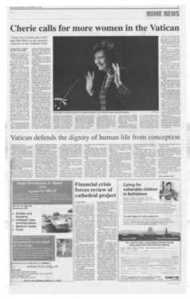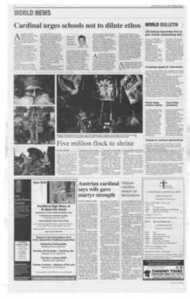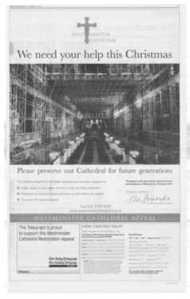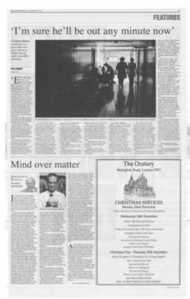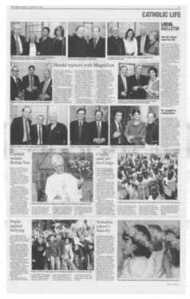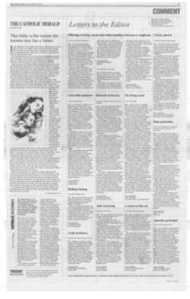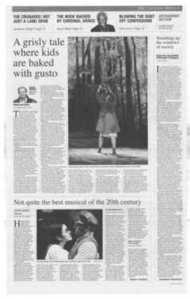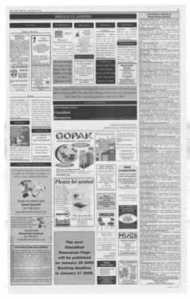Page 8, 19th December 2008
Page 8

Report an error
Noticed an error on this page?If you've noticed an error in this article please click here to report it.
Tags
Share
Related articles
Bethlehem Bells Are Ringing Across The World
Violence Forces Fresh Exodus Of Christians From The Holy...
He
Christ’s Cradle Crumbles
How Still We See Thee Lie...
'We are living in a tomb'
Few Christians are suffering like those in Christ's birthplace, reports Clara Leeming in Bethlehem In a corner of Bethlehem, a 30-foot wall snakes around three sides of a solitary building.
The only facade not encased by towering, graffiti-covered concrete looks out instead at a deserted plot of land, strewn with discarded breeze blocks and weeds.
Only the most inquisitive visitors leave behind Bethlehem's Nativity shrines to follow the security barrier that now dominates the town's northern reaches.
But those who malce it to this desolate enclave are confronted with a powerful metaphor for the fate that is befalling Palestine's Christians.
The house with seven walls is home to 14 members of the Anastas family, nine of whom are children.
Devout Catholics who were once prosperous shop owners, their lives have fallen apart over the last decade leaving them bereft of hope and fearful for the future.
The Rachel's Tomb area in which they live was once a vibrant neighbourhood and a central artery between the West Bank town of Bethlehem and Jerusalem, just seven miles away.
The division of territory under the terms of the 1493 Oslo Peace Accords and the Second Intifada contributed to its decline. Construction of Israel's wall five years ago was its death knell.
The drab concrete panels that now strangle the Anastas house transformed their street into a dead end and their neighbourhood into a military zone.
Their souvenir shop and mechanic's workshop on the ground floor of their building were forced to close. No one walks down a broken street that runs into a solid wall. The area became so intimidating that friends are unwilling to visit the house. The wall even blocks out the sun, leaving parts of the building in permanent shadow.
Mother Claire Anastas, who shares the house with husband Johnny, two sons and two daughters aged between 12 and 19, and their extended family, says: "We are living in a tomb. Every time we look out of a window the wall is there, burying us alive. We do not want to live in this situation but have nowhere else to go. This wall has destroyed our lives and our livelihoods and stolen our children's childhoods."
In Bethlehem, as elsewhere. the controversial barrier does not follow the 1967 border but dips deep into the West Bank. Israeli authorities openly admitted the reason while it was being built. The route ensured that Rachel's Tomb a Jewish pilgrimage site directly opposite the Anastas house would stay on their side.
Control of the Tomb, a major Bethlehem landmark that is also holy to Christians and Muslims, was handed to Israel after Oslo. It was not long before the site had been enclosed by concrete barriers and guard towers. An army camp was built nearby and a checkpoint put in.
The street was left deserted as customers were refused access by the army on security grounds. Businesses failed. and one by one the merchants and other residents left.
But with so many members and no compensation on offer the Anastas family found itself stranded.
At the height of the Intifada, they endured 18 months of curfew. Their home was frequently caught in the crossfire between the soldiers and Palestinian gunmen.
Then, just when the family believed it could not possibly get worse, they learned that their home would be all but surrounded by a wall. Preparations began in 2002 but the present structure appeared in just one day the following year.
"On the day they built it, our children went to school as normal," says Mrs Anastas, 39. "When they returned. the wall was in place. When they stood in their bedrooms they could see that we were surrounded.
"My youngest son, Daniel, was seven when it was built. The children do not know a normal life without these problems. It has had a terrible impact on them: it has stolen their childhoods."
There was widespread condemnation when Israel built the wall, which has come to symbolise the festering IsraeliPalestinian conflict that continues to divide the Holy Land after decades of bloodshed.
Bethlehem has been the source of several suicide bombings. Concrete blocks were used to prevent shooting attacks.
Yet the Christian community here blames the wall for turning their home town into an economically backward ghetto. The wall cuts many families off from relatives and work opportunities and puts tourists off spending time and money in the town. . It also separates many from their ancestral land: a source of anger in a town now surrounded by illegal Jewish settlements.
The barrier was declared illegal by the International Court of Justice in The Hague in 2004. The Holy See, among others, has said numerous times that civilians would be the ones to suffer and called for diplomatic solutions.
Last year its permanent observer at the United Nations, Archbishop Celestino Migliore, told member states that it was vital to ensure "permanent, free and unhindered access to the holy places by the faithful of all religions and nationalities".
Such admonishments do little to challenge the situation on the ground though. As soon as the Bethlehem section of the wall was completed, construction began on a new ultra-orthodox Jewish settlement next to Rachel's Tomb.
Under international law it is illegal to transfer civilian population to occupied land, but Israel regards such settlements as natural exten: sions of south Jerusalem.
On the Bethlehem side of the barrier the suffering is very real. It's almost a decade since the Anastas family made a living from their shops and with jobs hard to come by they are heavily in debt. The religious carvings they used to sell now gather dust in the locked gift shop.
But Mrs Anastas's fears are not only for her own family. She worries about the fate of Palestinian Christianity. From between 15 and 20 per cent of the population at the start of the Arab-Israeli conflict, emigration has left Christians accounting for just one per cent of West Bank Palestinians.
In Bethlehem, where 80 per cent of the population used to be Christian, more than 400 families have left over recent years.
The only way to halt this crisis, Mrs Anastas believes: is for pilgrims to visit Bethlehem and put money into the crippled economy. And through prayer.
"We are a Catholic family that has lost everything in the town where Jesus was born but we are not the only ones," she says. "We Christians are suffering greatly in Bethlehem.
"For us it's an awful situation to think we are losing Christianity from one of our holiest places, but to stop it happening we need the help and support and prayers of churches and believers abroad."
blog comments powered by Disqus




